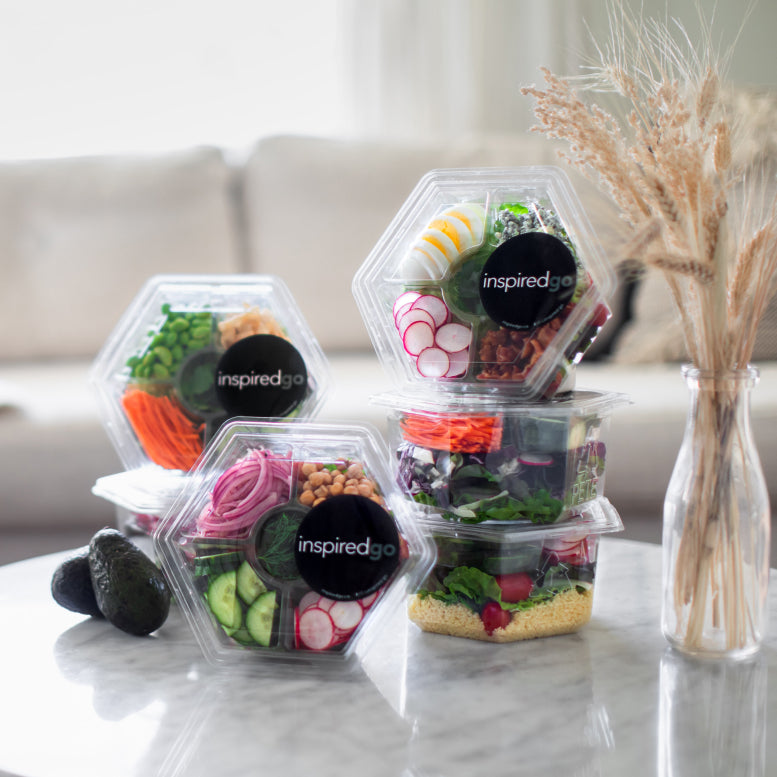What’s The Difference Between Vegan And Vegetarian?
Table of Contents
1. Understanding The Distinctions Between Vegan and Vegetarian Diets
2. What Do I Eat on a Vegan Diet?
3. How Can Vegan Meal Delivery Support Weight Management?
4. How Does Inspired Go Make Vegan Eating Easy?
1. Understanding The Distinctions Between Vegan and Vegetarian Diets
Choosing between a vegan or vegetarian diet depends on personal health goals, ethical beliefs, and dietary preferences. Both diets can offer a plethora of nutritious options, like our diverse range of nutrient-packed salads and bowls. These meals are designed to provide balanced and satisfying nutrition that aligns with your dietary choice, whether you’re vegetarian, vegan or just aiming to reduce your meat consumption.
Order fresh salads today →


2. What Do I Eat on a Vegan Diet?
A vegan diet offers a wide variety of plant-based foods, far beyond simple salads or steamed vegetables. Staples of vegan meals include legumes, whole grains, nuts, seeds, fruits, and vegetables, which together provide balanced macronutrients and essential vitamins. Protein sources include chickpeas, lentils, tofu, tempeh, and seitan, while healthy fats come from avocados, nuts, and seeds. Vegan meal delivery services take these ingredients and transform them into flavorful dishes such as vegan curries, grain bowls, pasta, and tacos. These services also ensure variety by offering global-inspired flavors and seasonal produce, keeping meals exciting and satisfying. With vegan meal delivery, customers can enjoy a diverse range of delicious, plant-based meals without repetitive menu choices or time-consuming preparation.
Choose your salads and schedule delivery →
3. How Can Vegan Meal Delivery Support Weight Management?
Vegan meal delivery services play a significant role in supporting weight management goals through portion control and nutrient-dense ingredients. Plant-based meals are naturally high in fiber, which promotes satiety and prevents overeating. Proteins from tofu, chickpeas, and lentils offer sustained energy, while complex carbohydrates from grains provide long-lasting fullness. Vegan meal delivery services offer calorie-counted meals tailored to weight loss or maintenance goals, removing the need for tracking or guesswork. Additionally, avoiding overly processed vegan junk food ensures meals remain aligned with health objectives. By offering pre-measured, balanced meals, vegan meal delivery supports sustainable weight management while maintaining variety and satisfaction.
Get fresh salads and snacks delivered →
4. How Does Inspired Go Make Vegan Eating Easy?
Inspired Go eliminates the hassle of meal planning, shopping, and cooking while still delivering nutritionally balanced vegan meals. Each dish is crafted with fresh, high-quality ingredients and designed to provide a full spectrum of essential nutrients, including plant-based proteins, fiber, and healthy fats. Inspired Go’s chefs draw inspiration from global cuisines, creating delicious, ready-to-eat options like grain bowls, vibrant salads, and hearty pasta dishes. With detailed nutritional labeling, customers can track their intake confidently, ensuring they meet their dietary needs without the complexity of meal prep. Whether you’re a long-time vegan or just exploring plant-based eating, Inspired Go offers a simple, delicious, and convenient way to enjoy a healthy vegan diet.
Try our fresh, ready-to-eat salads →
Frequently Asked Questions
The key difference between vegan and vegetarian diets lies in the exclusion of animal products. Vegetarians avoid meat, poultry, and fish but may consume animal-derived products like eggs, dairy, or honey. Vegans, on the other hand, exclude all animal products, focusing solely on plant-based foods. Veganism is often a lifestyle choice, avoiding animal products in all forms, including clothing and cosmetics.
A vegan diet consists entirely of plant-based foods, including fruits, vegetables, grains, nuts, seeds, and legumes. It excludes all animal-derived products, such as meat, fish, dairy, and eggs. This diet emphasizes nutrient-dense, whole foods, though processed vegan alternatives are available. A vegan diet, when well-balanced, supports good health and environmental sustainability, making it popular for ethical, health, and ecological reasons.
Not all vegan diets are gluten-free. While veganism excludes animal products, gluten is a protein found in wheat, barley, and rye, which are plant-based and commonly included in vegan meals. To maintain a vegan and gluten-free diet, focus on naturally gluten-free foods like fruits, vegetables, rice, quinoa, and gluten-free grains. Always check labels for hidden gluten in processed vegan foods.
On a vegan diet, you can enjoy a wide variety of plant-based foods, including fruits, vegetables, legumes, nuts, seeds, whole grains, and plant-based dairy alternatives. Popular vegan dishes include stir-fries, salads, grain bowls, soups, and curries. Incorporating fortified foods or supplements ensures you meet nutrient needs like B12, iron, and omega-3s, making the diet balanced and enjoyable.
A vegan diet can be very healthy when balanced and diverse. It’s rich in fiber, vitamins, and antioxidants, while being lower in saturated fat and cholesterol. These factors contribute to better heart health, weight management, and reduced risk of chronic diseases. However, careful planning is essential to ensure adequate intake of nutrients like vitamin B12, iron, and protein for overall health.

